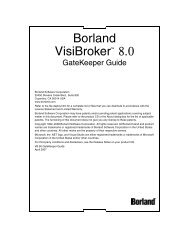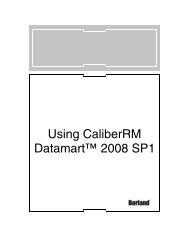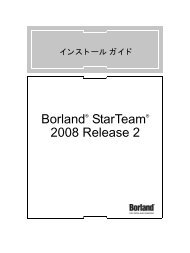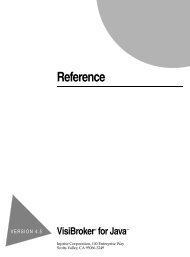web server - Borland Technical Publications
web server - Borland Technical Publications
web server - Borland Technical Publications
You also want an ePaper? Increase the reach of your titles
YUMPU automatically turns print PDFs into web optimized ePapers that Google loves.
Sessions in secondary storage<br />
If you set this property to a non-zero value, you can also set the integer property<br />
ejb.sfsb.instance_max for each deployed session bean in their deployment descriptors.<br />
This property defines the maximum number of instances of a particular stateful session<br />
bean that are allowed to exist in the EJB container's memory at the same time. If this<br />
number is reached and a new instance of a stateful session needs to be allocated, the<br />
EJB container throws an exception indicating lack of resources. 0 is a special value. It<br />
means no maximum set.<br />
If the maximum number of stateful sessions defined by the ejb.sfsb.instance_max<br />
property is reached, the EJB container blocks a request for an allocation of a new bean<br />
for the time defined by the integer property ejb.sfsb.instance_max_timeout. The<br />
container will then wait for the number to drop below this value before throwing an<br />
exception indicating a lack of resources. This property is defined in ms (1/1000th of<br />
second). 0 is a special value. It means not to wait and throw an exception indicating<br />
lack of resources immediately.<br />
Aggressive Passivation<br />
One of the key advantages in the use of JSS is its ability to fail over. Several containers<br />
implementing JSS can be configured to use the same persistent store, allowing them to<br />
fail over to each other. Setting up the JSS for failover is discussed in Chapter 6, “Java<br />
Session Service (JSS) configuration.” To facilitate taking advantage of the JSS failover<br />
capability, <strong>Borland</strong> provides the option of using aggressive passivation.<br />
Aggressive passivation is the storage of session state regardless of its timeout. A bean<br />
that is set to use aggressive passivation will have its session state persisted every time<br />
it is polled, although its instance will not be removed from memory unless it times out.<br />
In this way, if a container instance fails in a cluster, a recently-stored version of the<br />
bean is available to other containers using identical JSS instances communicating with<br />
the same backend. As in simple passivation, if the bean times out, it will still be<br />
removed from memory.<br />
Again, aggressive passivation is set Partition-wide using the boolean property<br />
ejb.sfsb.aggressive_passivation. Setting the property to true (the default) stores the<br />
session's state regardless of whether it was accessed before the last passivation<br />
attempt. Setting the property to false allows the container to use only simple<br />
passivation. Again, this property is set in the container's properties file partition.xml<br />
located in:<br />
/var/domains/base/configurations/<br />
/ mos//adm/properties<br />
Bear in mind that although using aggressive passivation aids in failover, it also results<br />
in a performance hit since the container accesses the database more often. If you<br />
configure the JSS to use a non-native database (that is, you choose not to use<br />
JDataStore), the loss of performance can be even greater. Be aware of the trade-off<br />
between availability and performance before you elect to use aggressive passivation.<br />
Sessions in secondary storage<br />
Most sessions are not kept in persistent storage forever after they timeout. <strong>Borland</strong><br />
provides a mechanism for removing stored sessions from the database after a discrete<br />
period of time known as the keep alive timeout. The keep alive timeout specifies the<br />
minimum amount of time in seconds to persist a passivated session in stateful storage.<br />
The actual amount of time it is kept in the database can vary, since it is not wise from a<br />
performance standpoint to constantly poll the database for unused sessions. The<br />
actual amount of time a session is persisted is at least the value of the keep alive<br />
timeout and not more than twice the value of the keep alive timeout.<br />
108 BES Developer’s Guide

















